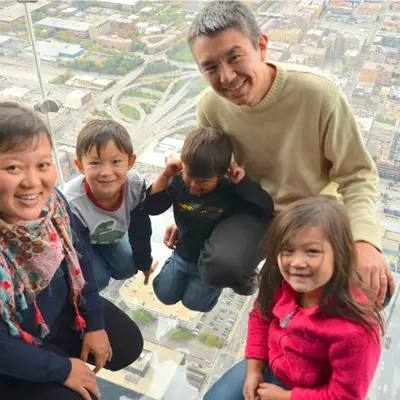
Faculty exchange program brings global perspective to USI
December 20, 2013
Dr. Johannes Hirata, from Hochschule Osnabrück University of Applied Sciences in Germany, is the first visiting scholar to take part in a new faculty exchange program at the University of Southern Indiana. He spent the fall semester teaching in USI's Romain College of Business. USI's Dr. Daria Sevastianova, associate professor of economics exchanged places with Dr. Hirata. She and her two-year-old daughter have been in Osnabrück since mid-September, where she is teaching similar economics courses at the Hochschule University.
Dr. Hirata, his wife, Karen, and their three children have been in Evansville since the end of July. After moving his family into an on-campus apartment, he started meeting with Dr. Sevastianova for an orientation to campus life as well as instructions for teaching her courses: ECON 241 (Global Economic Issues) and ECON 349 (Open Economy Macroeconomics) before she left for Germany.
Dr. Kevin Valadares, associate professor of health administration in the College of Nursing and Health Professions, helped facilitate the exchange of faculty members between the two universities.
"I, along with other faculty members at USI, have accompanied students to Osnabrück a few times, and we've had close to 15 students from there spend a semester here," said Dr. Valadares. "There have been so many positive things happen with the students' study abroad experiences that we thought maybe we should try a faculty exchange. It's just been a perfect fit for Johannes to be teaching here, and with his background, he offers USI students a unique global perspective."
Heidi Gregori-Gahan, director of International Programs and Services, agreed. "A vibrant exchange program allows us to develop deep and long-lasting relationships with our international partners, and often leads to increased international collaboration in the areas of research and scholarship," she said. "Dr. Hirata's presence at USI this semester has truly strengthened our partnership with the Hochschule, and has contributed to a greater awareness and appreciation of the benefits of international exchange among our faculty, staff and students. He and his family have been wonderful ambassadors!"
If Dr. Hirata seems to blend in perfectly at USI, it's because his family is a self-described melting pot, which he describes as having the "benefit of being familiar with the idea of being abroad." He grew up in Germany, the son of a Japanese father and a German mother. His wife is a native of Brazil, the daughter of two Japanese immigrants. At home, he, his wife, and children speak both German and Portuguese. In addition to Germany, he has studied and worked in the Netherlands, France, and Switzerland. He said the experience of living in Indiana - despite this summer's humidity-has been enriching in many ways.
In Evansville, the two oldest Hirata children, Raphael, 8, and Katharina, 7, have attended West Terrace Elementary School, where they are in the third and second grades. Phillip, four, is enrolled in USI's Children's Learning Center. Despite having known very little English before coming to the United States, all three children have adjusted well and even the four-year-old can carry on simple conversations in English. Their mother, Karen, also has been in school, this semester enrolling in USI's Intensive English Program.
The Hiratas say their children keep very busy in Evansville with many of the same activities they would be doing in Germany, such as piano lessons, violin lessons, and going to classmates' birthday parties. They've also found time to travel extensively, visiting Chicago, St. Louis, Atlanta, Nashville, Indianapolis, and even Walt Disney World in Florida. "Everything has worked out for us as a family," said Dr. Hirata. "There have been many good experiences and nice encounters since we've been here."
Dr. Sevastianova also has had a rewarding experience teaching abroad in Osnabrück. "Of course, it's a big adjustment not only to a different culture and lifestyle, but also a different academic culture and workplace," she said. "We've worked very hard to do well, for me as a visiting professor in Germany, and for my daughter as a first time kindergarten student. She's not even 3, but that's when they start kindergarten here. Right now, the town is decorated with Christmas trees and festive lights, and there are many kiosks downtown, selling food, treats, spiced wine, and many arts and crafts. This is a great opportunity to celebrate and enjoy the social scene with our friends. My daughter also loves the old fashioned carousel which plays traditional German Christmas songs."
Dr. Sudesh Mujumdar, associate professor of economics and chair of the economics and marketing department at USI, said that Dr. Sevastianova "played a big role" in the success of the faculty exchange, along with many others at USI, including President Linda L. M. Bennett, Provost Ronald Rochon, Dr. Mohammed Khayum, dean of the Romain College of Business, and Gregori-Gahan.
"For our students, having Dr. Hirata teach at USI was an opportunity for them to learn first-hand about economic, political, and social issues in Europe and get a big picture sense of the connections between the United States and Europe with a focus on the relative roles of the European Central Bank and the Federal Reserve," said Dr. Mujumdar. "As opposed to a quick lecture from a visiting professor, Johannes gave our students more time to dig into the issues because he has been here the entire semester."
Dr. Mujumdar said he hopes that other colleges at USI will follow the faculty exchange model set up by the Romain College of Business. "We're always looking for ways to project USI's image and brand beyond the Tri-state and the shores of the United States," he said. "Now we have a process in place for a faculty exchange with Germany, so it might be easier for someone else to do this."